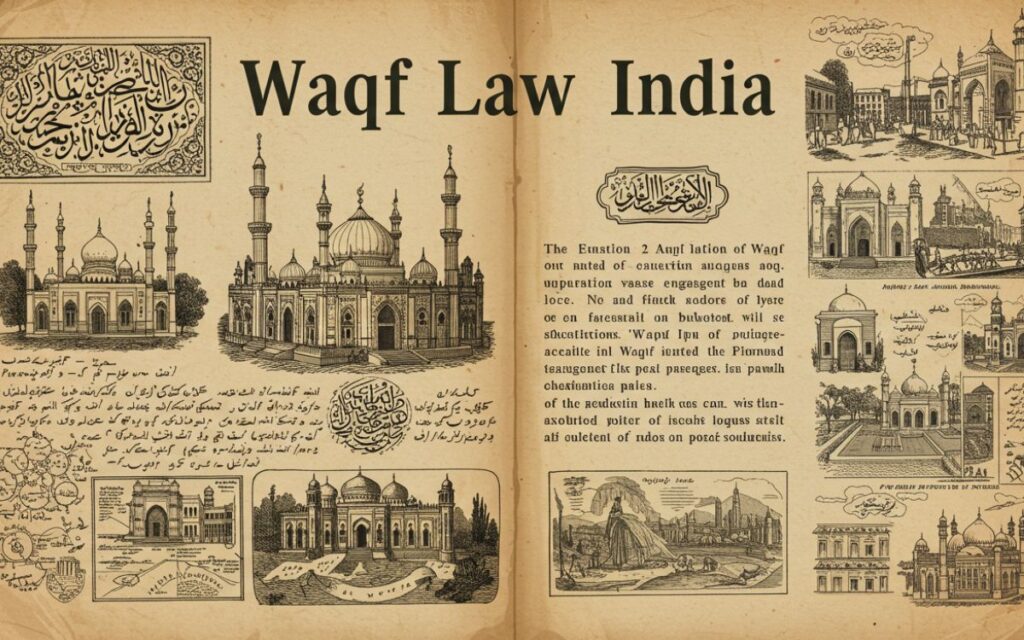Waqf Law: The new Waqf Act of 2025 is under fire, and it’s not just from a few voices — nearly 65 petitions have landed in the Supreme Court questioning different parts of the law. So, what exactly is causing all the noise? Let’s break it down in a way that makes it easy to follow.

The Latest Update
The Supreme Court recently put off giving a temporary decision on the case until May 5. Why? Because the government said it needed more time to explain its side. For now, though, the Centre has said it won’t make any appointments of non-Muslims to Waqf boards or change anything about Waqf properties until that next court date.
Who’s Challenging the Law?
This isn’t just a legal issue for one person or one group. Well-known politicians and leaders — including Asaduddin Owaisi, Mahua Moitra, Manoj Kumar Jha, and others from different political parties — have come together to oppose the law. Religious leaders like Maulana Mahmood Asad Madani from Darul Uloom Deoband are also part of this.
What’s the Main Problem?
At the heart of the matter is the feeling that the new law goes against religious rights. These rights are protected by the Constitution, which gives every group the freedom to handle their own religious matters — as long as they don’t harm public order, health, or morality.
Here are the top concerns raised by those opposing the law:
1. End of “Waqf by Use”
Earlier, land used for Muslim religious or charity work for a long time could be treated as Waqf — even if it wasn’t officially recorded. This made sense in many old towns where such records didn’t exist.
Now, the new law says that only registered properties will count. So, if a mosque or graveyard has been used for centuries but isn’t on paper, it might no longer be protected. That’s a big deal. In fact, Chief Justice Khanna himself asked, “How do you register a property that’s been used for 300 years?”
2. Power Given to the District Collector
Another controversial change is the role of the district collector. If they decide that a piece of land is government-owned, it stops being considered Waqf until a court decides. That means Waqf status can be taken away temporarily — without a court ruling — just on the collector’s word.
3. Including Non-Muslims on Waqf Boards
One of the most debated points is that the new law allows non-Muslims to be members of Waqf boards. Critics say this goes against the right of any community to manage its own religious places and property.
The Centre has said that this won’t take away the majority voice of the Muslim community on the boards, but petitioners argued that even having one outsider is unnecessary and inappropriate. The court seemed skeptical, even asking whether the government would be okay with Muslims joining Hindu temple boards.
4. Bringing in the Limitation Act
The older law from 1995 didn’t allow a time limit on taking back Waqf land that had been taken over. But the new law does. Now, if too much time passes, Waqf authorities may no longer be able to reclaim such land — even if it was clearly theirs.
While the court noted that time limits can help in some cases, many feel this change weakens the Waqf’s ability to protect its lands.
So, What Happens Next?
The Supreme Court is looking at these questions carefully. For now, the government has promised not to make any major changes until May 5, when the court takes another look.
This case is about more than just legal rules. It touches on history, community rights, and how faith-related properties are handled in a modern, democratic country. As more hearings take place, the country will be watching closely.
Laws like these affect real people, old neighborhoods, and places that hold emotional value. It’s important that any change is balanced, respectful, and keeps the spirit of fairness alive. We’ll have to wait and see how things unfold in court, but for now, the discussion has definitely begun.